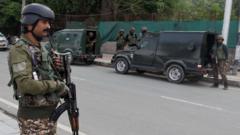The recent ceasefire agreement brokered by the US between India and Pakistan holds amid accusations, marking a potentially pivotal moment in longstanding tensions.
India-Pakistan Ceasefire Holds Amid Accusations and Tension

India-Pakistan Ceasefire Holds Amid Accusations and Tension
A fragile peace emerges as both nations trade blame over violations after a historic ceasefire.
In a dramatic turn of events, the ceasefire between India and Pakistan has held firm overnight following a flurry of accusations from both countries regarding violations of the truce. This fragile peace emerged after days of severe military confrontations that culminated in a US-brokered ceasefire deal, marking one of the worst escalations between the two nuclear adversaries in decades.
U.S. President Donald Trump commended the leaders of both nations for their cooperation, recognizing that without the ceasefire, countless lives could have been lost. Just hours after the announcement, locals in Indian-administered Kashmir reported hearing explosions and seeing bright flashes in the sky, igniting fears that the agreement might be tenuous. Both nations accused each other of breaching the ceasefire within minutes of its announcement, reflecting the deep-rooted distrust that characterizes India-Pakistan relations.
The conflict escalated following a militant attack in Pahalgam, which claimed the lives of 26 tourists, prompting India to conduct military strikes targeting alleged militant positions in Pakistan. Pakistan denied any involvement in the attack, standing firm on its call for restraint despite India's assertions of ongoing provocations.
The agreement, confirmed by India's External Affairs Minister S. Jaishankar, represents a joint commitment to halt military operations. Prime Minister Shehbaz Sharif expressed optimism that the ceasefire would benefit all involved. Meanwhile, US Secretary of State Marco Rubio announced that talks would commence on a range of issues at a neutral venue, demonstrating continuing international interest in mediating peace between the two nations.
UN Secretary-General Antonio Guterres welcomed the ceasefire, while UK Prime Minister Sir Keir Starmer indicated that the UK has played a role in facilitating discussions. With a backdrop of violence that resulted in at least 36 deaths in Pakistan and 21 civilian casualties from Pakistani shelling, the specter of further conflict looms large. This recent escalation highlights the intricacy and volatility of the Kashmir dispute, underscoring the urgent need for a sustainable resolution to ensure peace in the region.
U.S. President Donald Trump commended the leaders of both nations for their cooperation, recognizing that without the ceasefire, countless lives could have been lost. Just hours after the announcement, locals in Indian-administered Kashmir reported hearing explosions and seeing bright flashes in the sky, igniting fears that the agreement might be tenuous. Both nations accused each other of breaching the ceasefire within minutes of its announcement, reflecting the deep-rooted distrust that characterizes India-Pakistan relations.
The conflict escalated following a militant attack in Pahalgam, which claimed the lives of 26 tourists, prompting India to conduct military strikes targeting alleged militant positions in Pakistan. Pakistan denied any involvement in the attack, standing firm on its call for restraint despite India's assertions of ongoing provocations.
The agreement, confirmed by India's External Affairs Minister S. Jaishankar, represents a joint commitment to halt military operations. Prime Minister Shehbaz Sharif expressed optimism that the ceasefire would benefit all involved. Meanwhile, US Secretary of State Marco Rubio announced that talks would commence on a range of issues at a neutral venue, demonstrating continuing international interest in mediating peace between the two nations.
UN Secretary-General Antonio Guterres welcomed the ceasefire, while UK Prime Minister Sir Keir Starmer indicated that the UK has played a role in facilitating discussions. With a backdrop of violence that resulted in at least 36 deaths in Pakistan and 21 civilian casualties from Pakistani shelling, the specter of further conflict looms large. This recent escalation highlights the intricacy and volatility of the Kashmir dispute, underscoring the urgent need for a sustainable resolution to ensure peace in the region.





















